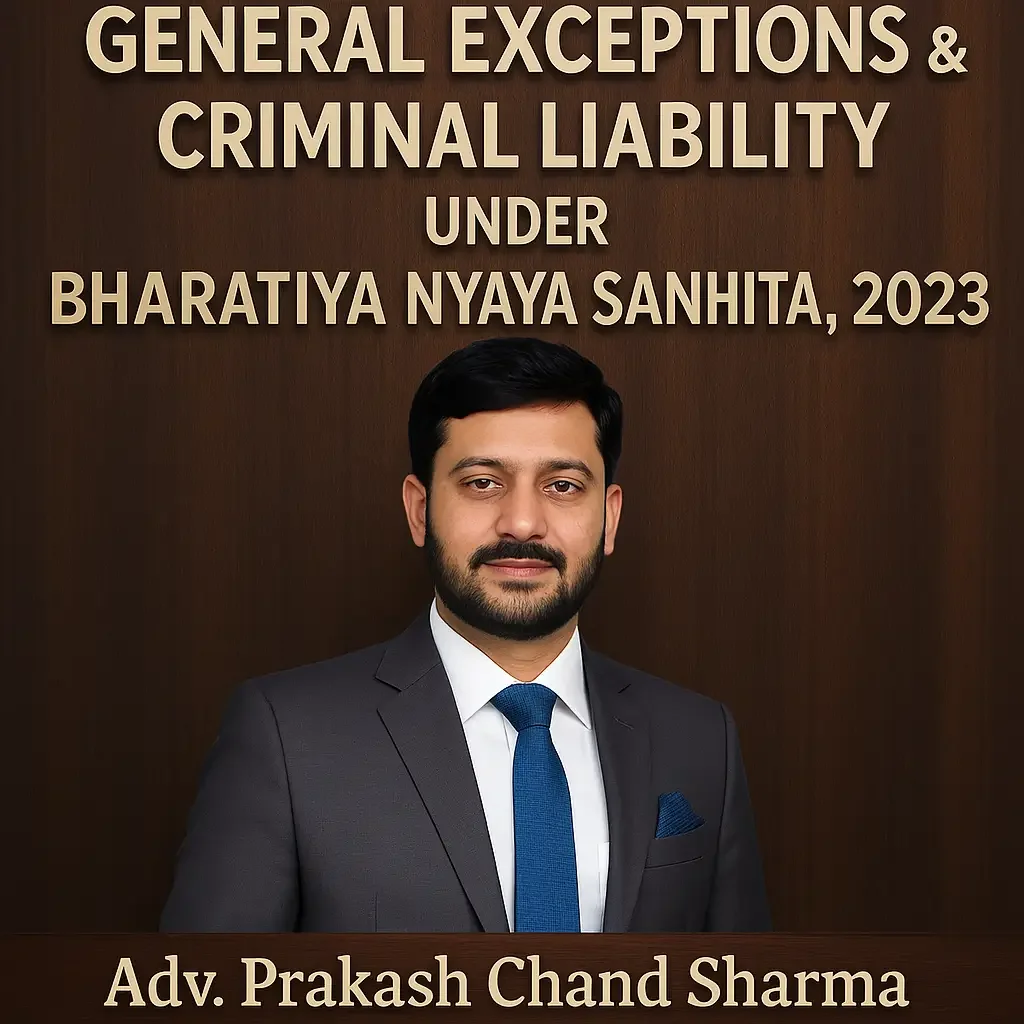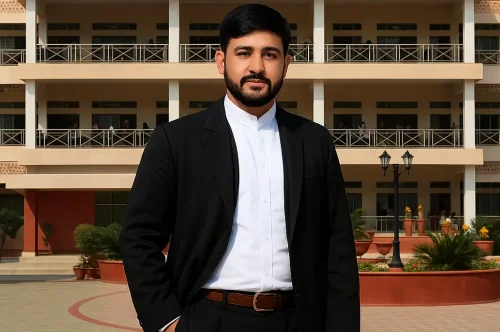
General Exceptions & Criminal Liability Under Bharatiya Nyaya Sanhita (BNS), 2023
By Adv. Prakash Chand Sharma
Chartered Engineer | High Court Advocate | CAO
Founder – Zumosun Universe, Techlam Legal Solutions, JPSD Taxsun LLP
Powered by: TheLegalCourt.com | TheLegalBank.com
Introduction
The Bharatiya Nyaya Sanhita, 2023 (BNS), which replaces the Indian Penal Code, 1860 (IPC), preserves the foundational principles of criminal liability while modernising terminology and classifications.
The General Exceptions remain one of the most crucial components of criminal law. These provisions ensure that no person is punished without considering:
-
The intention (mens rea)
-
The nature of the act
-
Circumstances surrounding it
-
Mental capacity
-
Consent
-
Accident, mistake, duress
-
Legal or judicial authority
Understanding these exceptions is vital for criminal defence, judicial interpretation, police procedures, and corporate risk management.
1. Concept of Criminal Liability (Actus Reus + Mens Rea)
For a crime under BNS, two elements must exist:
✔ Actus Reus – The wrongful act
✔ Mens Rea – The guilty mind
Without criminal intention or unlawful motive, liability may not arise.
Exceptions operate as defences, negating one or both elements.
2. General Exceptions Under BNS (Equivalent to IPC 76–106)
These exceptions exempt the accused from criminal liability in specific situations.
Below is a commercially structured explanation useful for legal practitioners, institutions, and enforcement agencies.
3. Mistake of Fact (Not Mistake of Law)
If an act is done:
✔ Under mistake of fact,
❌ Not under mistake of law,
→ The act is excused.
Examples in practice:
-
Police officer arrests a person believing a warrant is valid.
-
Security guard uses force believing intruder is armed.
Commercial relevance:
Common in compliance, corporate security, and administrative functions.
4. Judicial Acts & Legal Duties
A judge acting within jurisdiction or a person executing judicial orders is protected.
Examples:
-
Bailiff executing an eviction order.
-
Police executing a court warrant.
Professionals must ensure good faith and authority.
5. Accident in Doing a Lawful Act
If harm occurs:
-
Without intention
-
While performing a lawful act
-
Using lawful means
-
With due care
→ It is a valid defence.
Practical examples:
-
Surgeon performing risky surgery.
-
Driver following traffic rules but accident happens due to sudden brake failure.
6. Absence of Criminal Intention (Good Faith Defense)
If an act is done in:
-
Good faith
-
For the benefit of a person
-
With due care
It may be exempt.
Examples:
-
Doctor giving emergency treatment that unintentionally harms patient.
-
Corporate manager taking immediate action to protect public despite risk.
7. Consent Defense
When a person voluntarily consents to suffer harm:
✔ The act may not be an offence (within limits).
❌ Cannot apply to serious bodily injury or death.
Examples:
-
Medical operations
-
Sports activities
-
Professional hazards
8. Duress / Fear of Injury
Acts committed under immediate threat to life or severe harm may be exempt.
Except:
❌ Murder
❌ Offences against state
9. Infancy (Children Below Specified Age)
Children below a certain age are:
✔ incapable of forming mens rea
✔ protected from criminal liability
(Exact age limits updated in BNS)
10. Insanity / Unsoundness of Mind
If a person is:
-
Incapable of understanding nature of act
-
Incapable of knowing it is wrong or illegal
→ He is exempt from liability.
Medical evidence and expert testimony are essential.
11. Intoxication Defense
If intoxication is:
✔ involuntary
❌ not voluntary
→ It may be a valid defence.
12. Self-Defence (Private Defence)
(One of the strongest defences under criminal law)
A person may use reasonable force to protect:
-
Himself
-
Property
-
Another person
But force must be:
✔ proportionate
✔ necessary
✔ immediate
13. Acts of Public Servants
Public servants are protected when:
✔ Acting in good faith
✔ Under lawful authority
✔ Performing official duties
Corporate and administrative decisions often rely on this principle.
14. Communication in Good Faith
Defamation exceptions apply when:
✔ A person communicates truthfully
✔ For the protection of another person’s interests
✔ Without malice
Conclusion
General Exceptions under the Bharatiya Nyaya Sanhita form the defensive backbone of criminal jurisprudence. They ensure that punishment is based on intention, fairness, and circumstances—not merely on the occurrence of harm.
For legal professionals, corporates, institutions, law enforcement, and judiciary, understanding these exceptions is crucial for ethical decision-making, defence strategy, and compliance management.
Author
Adv. Prakash Chand Sharma
Chartered Engineer | High Court Advocate | CAO
Founder – Zumosun Universe, Techlam Legal Solutions, JPSD Taxsun LLP
Powered by: TheLegalCourt.com | TheLegalBank.com



